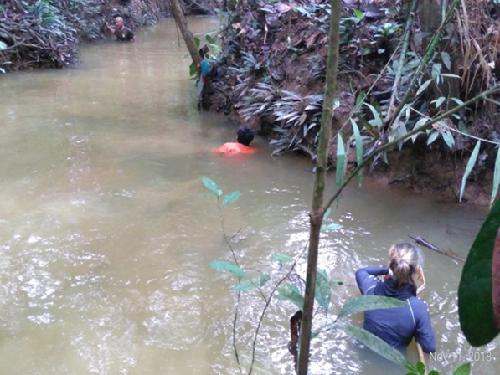Alexandra Zieritz
We will produce a comprehensive assessment of the freshwater mussel fauna of Brunei. In detail, we aim to:
(1) Determine diversity, distribution, environmental requirements and population characteristics of freshwater mussels in Brunei by combining fieldwork, molecular barcoding and environmental modelling.
(2) Identify the most vulnerable species, major threats and suitable sites for conservation efforts.
(3) Build local expertise in freshwater malacology and ecology, and ensure the continuation of our efforts after completion of the project.
(4) Raise awareness by disseminating outputs and results to the media, NGOs, schools, universities, museums and (non-)governmental authorities.
The proposed project builds on our previous work in Malaysian Borneo, which indicated severe declines in Bornean endemic species.

Sampling at site where Pseudodon walpolei has been reported.
Freshwater mussels (Unionida) inhabit the bottom of rivers and lakes across the globe, where they fulfil important ecosystem services such as water purification and providing food for rural communities. Unfortunately, these filter-feeding molluscs also represent one of the most endangered animal groups. In Malaysian Borneo, endemic mussel species have become extremely rare as a result of rapid deforestation, land-use change and pollution. In contrast, Brunei, wedged within Malaysian Sarawak, has retained much of its primary forest and may potentially serve as refuge for Borneo’s endemic mussels. However, Brunei’s freshwater mussels have not been surveyed for nearly 100 years, so that we lack even the most basic data needed for their conservation, including number, identities and distribution of species.
This project will comprehensively assess Brunei’s freshwater mussel diversity, ecology and conservation status, build local expertise in malacology and freshwater ecology, and raise awareness about the importance of freshwater mussels among the local population. Work will be conducted in collaboration between the University of Nottingham Malaysia Campus (project lead), Universiti Brunei Darussalam, Universiti Teknologi Brunei, Universiti Malaysia Sarawak and the IUCN.
We will survey at least 40 sites across all major river basins in Brunei. At each site, we will initially interview local residents about past or current presence of freshwater mussels, after which we will search for mussels visually, by hand-sampling and using a dredge. Environmental data, including water pH and nutrient concentrations, will be recorded for subsequent determination of habitat requirements of species. Voucher specimens (max 3-6 specimens per population) will be collected and permanently deposited at the Zoological Collection of the Universiti Brunei Darussalam. Species will be identified through a combination of molecular barcoding and morphological examination using available museum specimens and literature. The most important drivers of presence/absence of each species at a given site will be elucidated through multivariate statistics and species distribution modelling, examining a range of water chemistry, landscape, climatic and human predicators.
The gathered dataset and results will be used to identify the most rare and vulnerable species, major threats and suitable sites for conservation efforts. National and global Conservation Status of each species will be assessed according to IUCN guidelines. Results will be disseminated through a National Red-List, scientific papers and a report, and subsequently communicated to the general public through media and outreach events.